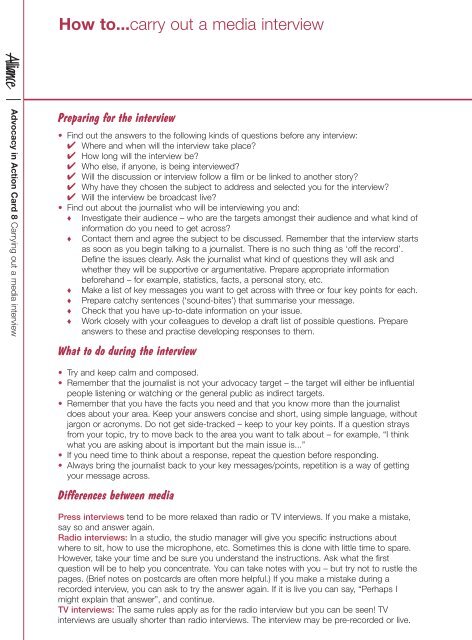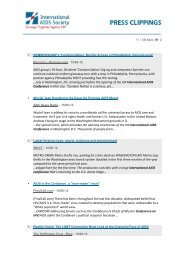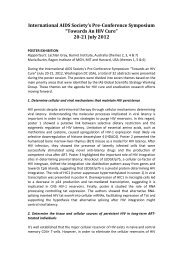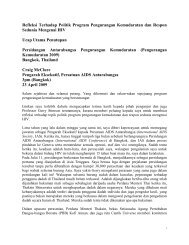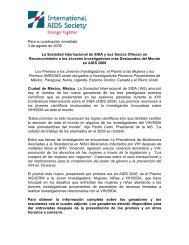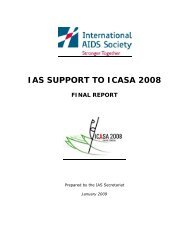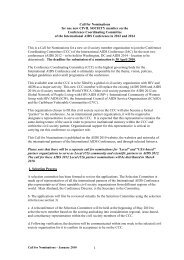Advocacy in Action - International AIDS Society
Advocacy in Action - International AIDS Society
Advocacy in Action - International AIDS Society
Create successful ePaper yourself
Turn your PDF publications into a flip-book with our unique Google optimized e-Paper software.
How to...carry out a media <strong>in</strong>terview<br />
<strong>Advocacy</strong> <strong>in</strong> <strong>Action</strong> Card 8 Carry<strong>in</strong>g out a media <strong>in</strong>terview<br />
Prepar<strong>in</strong>g for the <strong>in</strong>terview<br />
• F<strong>in</strong>d out the answers to the follow<strong>in</strong>g k<strong>in</strong>ds of questions before any <strong>in</strong>terview:<br />
✔ Where and when will the <strong>in</strong>terview take place?<br />
✔ How long will the <strong>in</strong>terview be?<br />
✔ Who else, if anyone, is be<strong>in</strong>g <strong>in</strong>terviewed?<br />
✔ Will the discussion or <strong>in</strong>terview follow a film or be l<strong>in</strong>ked to another story?<br />
✔ Why have they chosen the subject to address and selected you for the <strong>in</strong>terview?<br />
✔ Will the <strong>in</strong>terview be broadcast live?<br />
• F<strong>in</strong>d out about the journalist who will be <strong>in</strong>terview<strong>in</strong>g you and:<br />
♦ Investigate their audience – who are the targets amongst their audience and what k<strong>in</strong>d of<br />
<strong>in</strong>formation do you need to get across?<br />
♦ Contact them and agree the subject to be discussed. Remember that the <strong>in</strong>terview starts<br />
as soon as you beg<strong>in</strong> talk<strong>in</strong>g to a journalist. There is no such th<strong>in</strong>g as ‘off the record’.<br />
Def<strong>in</strong>e the issues clearly. Ask the journalist what k<strong>in</strong>d of questions they will ask and<br />
whether they will be supportive or argumentative. Prepare appropriate <strong>in</strong>formation<br />
beforehand – for example, statistics, facts, a personal story, etc.<br />
♦ Make a list of key messages you want to get across with three or four key po<strong>in</strong>ts for each.<br />
♦ Prepare catchy sentences (‘sound-bites’) that summarise your message.<br />
♦<br />
♦<br />
Check that you have up-to-date <strong>in</strong>formation on your issue.<br />
Work closely with your colleagues to develop a draft list of possible questions. Prepare<br />
answers to these and practise develop<strong>in</strong>g responses to them.<br />
What to do dur<strong>in</strong>g the <strong>in</strong>terview<br />
• Try and keep calm and composed.<br />
• Remember that the journalist is not your advocacy target – the target will either be <strong>in</strong>fluential<br />
people listen<strong>in</strong>g or watch<strong>in</strong>g or the general public as <strong>in</strong>direct targets.<br />
• Remember that you have the facts you need and that you know more than the journalist<br />
does about your area. Keep your answers concise and short, us<strong>in</strong>g simple language, without<br />
jargon or acronyms. Do not get side-tracked – keep to your key po<strong>in</strong>ts. If a question strays<br />
from your topic, try to move back to the area you want to talk about – for example, “I th<strong>in</strong>k<br />
what you are ask<strong>in</strong>g about is important but the ma<strong>in</strong> issue is...”<br />
• If you need time to th<strong>in</strong>k about a response, repeat the question before respond<strong>in</strong>g.<br />
• Always br<strong>in</strong>g the journalist back to your key messages/po<strong>in</strong>ts, repetition is a way of gett<strong>in</strong>g<br />
your message across.<br />
Differences between media<br />
Press <strong>in</strong>terviews tend to be more relaxed than radio or TV <strong>in</strong>terviews. If you make a mistake,<br />
say so and answer aga<strong>in</strong>.<br />
Radio <strong>in</strong>terviews: In a studio, the studio manager will give you specific <strong>in</strong>structions about<br />
where to sit, how to use the microphone, etc. Sometimes this is done with little time to spare.<br />
However, take your time and be sure you understand the <strong>in</strong>structions. Ask what the first<br />
question will be to help you concentrate. You can take notes with you – but try not to rustle the<br />
pages. (Brief notes on postcards are often more helpful.) If you make a mistake dur<strong>in</strong>g a<br />
recorded <strong>in</strong>terview, you can ask to try the answer aga<strong>in</strong>. If it is live you can say, “Perhaps I<br />
might expla<strong>in</strong> that answer”, and cont<strong>in</strong>ue.<br />
TV <strong>in</strong>terviews: The same rules apply as for the radio <strong>in</strong>terview but you can be seen! TV<br />
<strong>in</strong>terviews are usually shorter than radio <strong>in</strong>terviews. The <strong>in</strong>terview may be pre-recorded or live.


